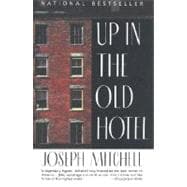
Note: Supplemental materials are not guaranteed with Rental or Used book purchases.
Purchase Benefits
What is included with this book?
| Author's Note | |
| McSorley's Wonderful Saloon | |
| The Old House at Home | p. 3 |
| Mazie | p. 23 |
| Hit on the Head with a Cow | p. 40 |
| Professor Sea Gull | p. 52 |
| A Spism and a Spasm | p. 71 |
| Lady Olga | p. 89 |
| Evening with a Gifted Child | p. 106 |
| A Sporting Man | p. 118 |
| The Cave Dwellers | p. 137 |
| King of the Gypsies | p. 145 |
| The Gypsy Women | p. 164 |
| The Deaf-Mutes Club | p. 210 |
| Santa Claus Smith | p. 224 |
| The Don't-Swear Man | p. 232 |
| Obituary of a Gin Mill | p. 243 |
| Houdini's Picnic | p. 253 |
| The Mohawks in High Steel | p. 267 |
| All You Can Hold for Five Bucks | p. 291 |
| A Mess of Clams | p. 303 |
| The Same as Monkey Glands | p. 314 |
| Goodbye, Shirley Temple | p. 325 |
| On the Wagon | p. 330 |
| The Kind Old Blonde | p. 337 |
| I Couldn't Dope It Out | p. 340 |
| The Downfall of Fascism in Black Ankle County | p. 346 |
| Blame It All on Mamma | p. 356 |
| Uncle Dockery and the Independent Bull | p. 364 |
| Old Mr. Flood | |
| Old Mr. Flood | p. 375 |
| The Black Clams | p. 390 |
| Mr. Flood's Party | p. 411 |
| The Bottom of the Harbor | |
| Up in the Old Hotel | p. 439 |
| The Bottom of the Harbor | p. 465 |
| The Rats on the Waterfront | p. 489 |
| Mr. Hunter's Grave | p. 504 |
| Dragger Captain | p. 537 |
| The Rivermen | p. 574 |
| Joe Gould's Secret | p. 623 |
| Table of Contents provided by Blackwell. All Rights Reserved. |
The New copy of this book will include any supplemental materials advertised. Please check the title of the book to determine if it should include any access cards, study guides, lab manuals, CDs, etc.
The Used, Rental and eBook copies of this book are not guaranteed to include any supplemental materials. Typically, only the book itself is included. This is true even if the title states it includes any access cards, study guides, lab manuals, CDs, etc.
Excerpted from Up in the Old Hotel by Joseph Mitchell
All rights reserved by the original copyright owners. Excerpts are provided for display purposes only and may not be reproduced, reprinted or distributed without the written permission of the publisher.